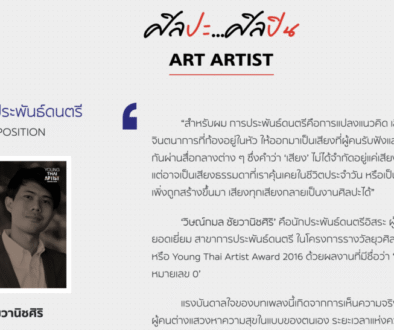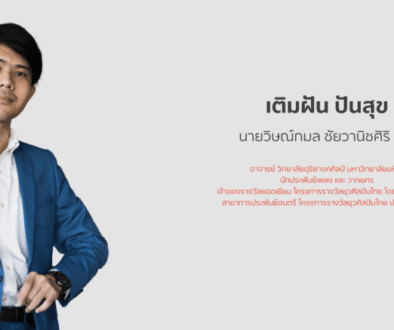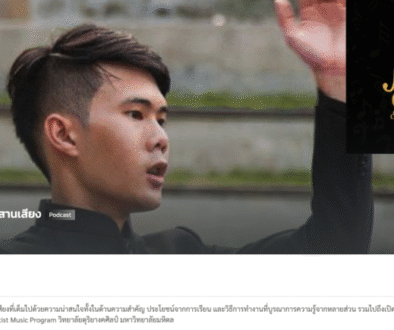Gen Z & Classical Music – EP. 253 – วิษณ์กมล ชัยวานิชศิริ นักประพันธ์เพลงชาวไทย
เผยแพร่ ณ https://podcast.thaipbs.or.th/podcast/genzandclassicalmusic/253
วันที่เผยแพร่ : 3 ก.พ. 67
ถอดความ และ สรุปเนื้อหาโดย Google Gemini Pro 2.5
พอดแคสต์ “GenZ and Classical Music” ตอนที่ 253 ดำเนินรายการโดย คุณมุก ณัฐฐา ควรขจร ได้เชิญคุณวิษณ์กมล ชัยวานิชศิริ หรือ “โก้” นักประพันธ์เพลงชาวไทย มาร่วมพูดคุยถึงเส้นทางชีวิตในวงการดนตรีและแนวคิดในการสร้างสรรค์ผลงาน
จุดเริ่มต้นและความสนใจในดนตรี (จากเปียโนสู่แซกโซโฟนและการประพันธ์เพลง) คุณโก้เล่าว่าจุดเริ่มต้นของเขาคือการเรียนเปียโนตั้งแต่เด็ก โดยจำไม่ได้ว่าอายุเท่าไหร่ แต่คาดว่าน่าจะประมาณ 3-5 ขวบ เขาไม่ใช่เด็กที่ขยันซ้อมมากนัก แต่กลับค้นพบความชอบในการ “กดนู่นกดนี่นอกเหนือจากโน้ต” หรือการด้นสด (improvise) ซึ่งในตอนนั้นยังไม่รู้จักคำนี้ เขาพบว่าการกดคอร์ดและสร้างสรรค์เสียงใหม่ๆ เป็นเรื่องสนุก
เมื่อเข้าสู่ช่วงประถมและมัธยม เขาได้เข้าวงโยธวาทิต และเริ่มเล่นแซกโซโฟน ในช่วงเดียวกันนั้น เขาก็มีความสนใจในคอมพิวเตอร์ และได้พบกับโปรแกรมสำหรับเขียนเพลง ทำให้เขาเริ่มลองเรียบเรียง (arrange) เพลงให้กับวงโยธวาทิต ก่อนที่จะพัฒนาไปสู่การแต่งเพลงของตัวเองในที่สุด
เส้นทางการศึกษาระดับอุดมศึกษา (จากสายวิทย์สู่การประพันธ์เพลงและอำนวยเพลง) คุณโก้เล่าว่าเขาไม่ได้ตั้งใจจะเรียนดนตรีด้วยซ้ำ และในสมัยมัธยมปลาย เขาเรียนสายวิทยาศาสตร์ ซึ่งเป็นความเชื่อของคนในยุคนั้นว่าการเรียนสายวิทย์จะเปิดโอกาสได้มากกว่า แม้จะเรียนสายวิทย์ แต่เขาก็เป็นคนที่รักศิลปะมาก ชอบทำกราฟิกดีไซน์และตัดต่อหนังสั้น
ในที่สุด เขาตัดสินใจสอบเข้ามหาวิทยาลัยดนตรีและเลือกเรียนสาขาการประพันธ์เพลง (Composition) ที่วิทยาลัยดุริยางคศิลป์ มหาวิทยาลัยมหิดล โดยสอบติดเป็นอันดับแรกในสาขานี้ เขายังเล่าติดตลกถึงเหตุผลที่เลือกสอบแซกโซโฟนในการ Audition เข้ามหาวิทยาลัยอื่นด้วย เพราะคิดว่าการอ่านโน้ตกุญแจเดียวของแซกโซโฟนน่าจะง่ายกว่าเปียโนที่ต้องอ่านสองบรรทัด
ในรั้วมหาวิทยาลัย คุณโก้ได้เรียนรู้เกี่ยวกับ ดนตรีร่วมสมัย (Contemporary Music) ซึ่งแตกต่างจากดนตรีประกอบหนังหรือเพลงป๊อปที่เขาคุ้นเคย ดนตรีร่วมสมัยเน้นดนตรีเชิงศิลปะ (Art Music) ที่อยู่ได้ด้วยตัวมันเอง ไม่จำเป็นต้องไพเราะเสมอไป เขายกตัวอย่างการประพันธ์เพลงโดยใช้กระบวนการทางคณิตศาสตร์ เช่น การทอยลูกเต๋าเพื่อกำหนดตัวโน้ต หรือการนำเสียงจากสภาพแวดล้อมมาตัดต่อและสร้างสรรค์เป็นดนตรี รวมถึงความเงียบก็สามารถเป็นส่วนหนึ่งของดนตรีได้เช่นกัน (อ้างถึง John Cage) อย่างไรก็ตาม เขาเน้นย้ำว่าการเรียนรู้พื้นฐานและกฎเกณฑ์การประพันธ์เพลงแบบมาตรฐานยังคงสำคัญ ก่อนที่จะ “แหกกฎ” หรือทดลองสิ่งใหม่ๆ ได้
นอกจากนี้ คุณโก้ยังมีความสนใจในการ อำนวยเพลง (Conducting) ตั้งแต่ปีหนึ่งและปีสอง เขากลับไปช่วยสอนวงโยธวาทิตโรงเรียนเก่า และรู้สึกว่าตนเองยังไม่เข้าใจวิธีการอำนวยเพลงที่ถูกต้อง เขาจึงปรึกษาอาจารย์ที่สอนวิชานี้และได้รับโอกาสให้เรียน Conducting ตั้งแต่ปีสอง ซึ่งปกติจะเรียนในปีสาม การได้เรียนทั้งการประพันธ์เพลงและการอำนวยเพลงควบคู่กัน ทำให้เขามีความเข้าใจดนตรีจากมุมมองของวาทยกรด้วย และสามารถนำไปปรับใช้ในการแต่งเพลงของตัวเองได้ดีขึ้น หลังจากจบปริญญาตรี เขายังตัดสินใจเรียนต่อปริญญาโทด้าน Conducting ที่มหิดลกับอาจารย์ธนพล เศตะพราหมณ์ ซึ่งเพิ่งกลับมาจากการศึกษาปริญญาเอกด้าน Conducting จากอเมริกา
ประสบการณ์การทำงานและการสอน: หลังจากจบปริญญาโท คุณโก้ได้รับโอกาสสอนวิชาทฤษฎีดนตรีพื้นฐาน และวิชาประสานเสียง (Choral Conducting) ของนักศึกษาปริญญาตรี ที่วิทยาลัยดุริยางคศิลป์ มหาวิทยาลัยมหิดล รวมถึงสอนดุริยางค์ที่โรงเรียนเตรียมอุดมดนตรี (Young Artist Music Program)
ผลงานประพันธ์เพลงเด่นและพัฒนาการสไตล์:
- เพลงแรก คือเพลงเปียโนชื่อ “Autumn Waltz” ซึ่งแต่งตามทฤษฎีดนตรีมาตรฐาน
- “Voices Of The King” เป็นเพลงที่ประพันธ์ให้วงวินด์และวงประสานเสียงของมหิดล โดยนำพระบรมราชโอวาทของในหลวง ร.9 มาใช้เป็นเนื้อร้อง เพื่อเฉลิมฉลองครบรอบ 69 ปีของในหลวง ร.9 ซึ่งเป็นโอกาสที่อาจารย์มอบหมาย (commission) ให้
- โปรเจกต์จบปริญญาตรี “Symphony” เป็นผลงานที่โดดเด่นอย่างยิ่ง โดยใช้พื้นที่ “ลานวงรี” กลางแจ้งของคณะดุริยางคศิลป์ มหิดลเป็นเวที เขานำวงออร์เคสตราไว้กลางลาน วงแจ๊สไว้ด้านขวาของผู้ชม วงฮอร์นไว้ด้านหลัง และวงเครื่องทองเหลือง (brass quintet) ไว้ด้านซ้าย ส่วนวงดนตรีไทยวางไว้ที่ศาลาดนตรีไทยริมน้ำ ทำให้ผู้ชมได้สัมผัสเสียงดนตรีจากรอบทิศทาง นอกจากนี้ยังผสมผสานดนตรีหลากหลายสไตล์ในเพลงเดียวกัน เช่น ดนตรีคลาสสิก แจ๊ส ดนตรีไทย และเทคนิคการสร้างเสียงแบบ “Noise” (การสร้างเสียงจากการเสียดสีหรือกระทบเครื่องดนตรี) รวมถึงการใช้เสียงร้องของวงคอรัสที่หลากหลาย ตั้งแต่คอร์ดไพเราะไปจนถึงเสียงกรีดร้องหรือเสียง “วู้ว”
- การประพันธ์เพลงวงวินด์ที่มีกลิ่นอายไทย: หลังเรียนจบปริญญาโท คุณโก้เริ่มให้ความสำคัญกับการประพันธ์เพลงวงวินด์ในสไตล์ที่เขาชื่นชอบ โดยเน้นการผสมผสานดนตรีพื้นเมืองของไทย ในบทเพลงต่างๆ เช่น:
- “เพลงแห่” ที่นำเพลงพื้นเมืองไทยมาผสมผสาน
- “เซนเซย์มาร์ช” (Sensei March) เพลงคอนเสิร์ตมาสสไตล์ญี่ปุ่นที่แต่งให้แก่อาจารย์อภิวุฒิ ซึ่งเป็นผู้เชี่ยวชาญด้านวงวินด์และเคยไปเล่นที่ญี่ปุ่น โดยใช้ทำนองเพลงลูกทุ่งและสามัคคีชุมนุมมาผสมผสานความเป็นไทย เขาเล่าว่าเวอร์ชันแรกมีความท้าทายมากสำหรับผู้เล่น
- “มาร์ชเจ้าพระยา” (Chao Phraya March) เป็นเพลงมาร์ชที่สองที่ได้รับความนิยมอย่างมากในช่วงโควิด-19 โดยนำทำนองเพลง “เห่” มาใช้ และได้ถูกบันทึกเสียงอย่างเป็นทางการโดยวง Feroci ทำให้เพลงเป็นที่รู้จักในวงกว้าง
- โปรเจกต์ปัจจุบัน: ล่าสุดคุณโก้ได้นำเพลง “เซนเซย์มาร์ช” มาปรับปรุงใหม่เพื่อให้เหมาะสมกับผู้เล่นระดับมัธยมทั่วไปมากขึ้น และกำลังจะมีเพลงคอนเสิร์ตมาร์ชใหม่ล่าสุดชื่อ “มาร์ชอาชา” (Aacha March) ซึ่งนำทำนองเพลง “อัศวลีลา” ของครูมนตรี ตราโมท มาใช้ (ซึ่งคนอาจรู้จักจากละครแก้วหน้าม้า) โดยวงราชวินิตบางแก้วได้บันทึกเสียงเป็นวงแรก
- ความสนใจใน Element ไทย: คุณโก้มีความสนใจอย่างมากในองค์ประกอบดนตรีไทยและดนตรีพื้นบ้านต่างๆ แม้จะเล่นดนตรีไทยไม่เป็น เขามองว่าดนตรีไทยมีเทคนิคการแต่งเพลงที่น่าสนใจที่สามารถนำมาใช้ในการประพันธ์เพลงสากลได้ โดยเฉพาะช่วงโควิด-19 ที่เขาจัดรายการพอดแคสต์ “Compose with Me” ทำให้ได้เรียนรู้จากนักแต่งเพลงไทยหลายท่าน
บทบาทในการส่งเสริมวงการดนตรี: คุณโก้ตระหนักถึงความสำคัญของ “Connection” ในวงการดนตรี และต้องการสนับสนุนนักแต่งเพลงรุ่นใหม่ โดยเฉพาะในช่วงโควิด-19 ที่เขาจัดรายการออนไลน์เพื่อให้นักแต่งเพลงได้มาแบ่งปันเรื่องราว ปัจจุบัน เขาได้สร้างกลุ่ม Facebook ชื่อ “Thai Wind Ensemble Composers Community” (ปัจจุบัน พ.ศ. 2568 คือโครงการ Thai Wind Composers) ซึ่งเป็นแพลตฟอร์มให้นักประพันธ์เพลงวงวินด์ชาวไทยได้แลกเปลี่ยนไอเดีย เคล็ดลับ และถามคำถามต่างๆ เพื่อช่วยให้น้องๆ ได้รู้จักพี่ๆ และคอนดักเตอร์ชาวไทยได้รู้จักเพลงของคนไทยมากขึ้น และส่งเสริมให้เพลงไทยได้เล่นในระดับโลก
English Translation
Translated by Google Gemini 2.5 Pro on November 17, 2025
Published at: https://podcast.thaipbs.or.th/podcast/genzandclassicalmusic/253
Published: February 3, 2024 Transcribed and Summarized by: Google Gemini Pro 2.5
The podcast “GenZ and Classical Music,” Episode 253, hosted by Mook Nuttha Kuankajorn, invited Viskamol Chaiwanichsiri, a Thai composer, to discuss his life journey in the music world and his creative philosophies.
Starting Point and Interest in Music (From Piano to Saxophone and Composition) Viskamol shared that his starting point was learning piano as a child. He doesn’t remember his exact age but estimates it was around 3-5 years old. He wasn’t a very diligent student but discovered a love for “pressing this and that beyond the notes,” or improvisation, a term he didn’t know at the time. He found that pressing chords and creating new sounds was fun.
Upon entering primary and secondary school, he joined the marching band and began playing the saxophone. During the same period, he developed an interest in computers and discovered software for writing music. This led him to start arranging songs for the marching band, which eventually evolved into composing his own music.
Higher Education Path (From Science to Composition and Conducting) Viskamol mentioned that he didn’t originally intend to study music. In high school, he was in the science stream, which was a common belief at the time that studying science opened up more opportunities. Despite being in the science stream, he was a person who loved art, enjoying graphic design and editing short films.
Eventually, he decided to audition for music university and chose to major in Composition at the College of Music, Mahidol University, placing first in the admissions for that major. He also joked about the reason he chose to audition with the saxophone at other universities, thinking that reading a single clef for the saxophone would be easier than the piano, which requires reading two staves.
In university, Viskamol learned about Contemporary Music, which was different from the film scores or pop music he was familiar with. Contemporary Music emphasizes Art Music, which can stand on its own and does not always need to be beautiful. He gave examples of composing using mathematical processes, like rolling dice to determine notes, or recording, editing, and creating music from environmental sounds. Even silence could be part of the music (referencing John Cage). However, he emphasized that learning the fundamentals and standard rules of composition is still important before one can “break the rules” or experiment with new things.
Additionally, Viskamol became interested in Conducting in his first and second years. He returned to help teach his old school’s marching band and felt he didn’t yet understand the correct conducting techniques. He consulted his professor and was given the opportunity to study conducting starting in his second year, a course normally taken in the third year. Studying both composition and conducting concurrently gave him a deeper understanding of music from a conductor’s perspective, which he could apply to improve his own compositions. After finishing his bachelor’s degree, he decided to continue his master’s degree in Conducting at Mahidol with Ajarn Thanapol Setabramana, who had just returned from his doctoral studies in conducting in the United States.
Work and Teaching Experience After graduating with his master’s, Viskamol was given the opportunity to teach basic music theory and Choral Conducting courses for undergraduate students at the College of Music, Mahidol University, as well as teaching ensembles at the Young Artist Music Program.
Notable Compositions and Stylistic Development
- His first song was a piano piece titled “Autumn Waltz,” which was composed according to standard music theory.
- “Voices Of The King” was a piece composed for the Mahidol wind ensemble and choir, commissioned by a professor. It used the royal guidance of King Bhumibol Adulyadej (Rama IX) as lyrics to celebrate the 69th anniversary of King Rama IX.
- His bachelor’s degree graduation project, “Symphony,” was an exceptionally prominent work. It used the “Oval Lawn,” an outdoor space at the College of Music, as its stage. He placed the orchestra in the middle of the lawn, a jazz band to the audience’s right, a horn ensemble behind, and a brass quintet to the left. A Thai music ensemble was positioned at the waterside Thai music pavilion, allowing the audience to experience music from all directions. The piece also blended various musical styles, such as classical, jazz, and Thai music, and included “Noise” techniques (creating sounds from friction or percussion on instruments) as well as diverse choral vocalizations, ranging from beautiful chords to screams or “whoosh” sounds.
- Composing for Wind Band with a Thai-influenced style: After his master’s degree, Ko began to focus on composing for wind band in a style he loved, emphasizing the integration of Thai folk music in various pieces, such as:
- “Hae” (Procession Song), which incorporates Thai folk music.
- “Sensei March,” a Japanese-style concert march written for Ajarn Apivut, a wind band expert who had played in Japan. It used Luk Thung (Thai country music) and “Samakkhi Chumnum” (a traditional Thai unity song) melodies to incorporate Thainess. He noted that the first version was very challenging for the players.
- “Chao Phraya March” was his second march, which became very popular during COVID-19. It used a “Heh” (a type of Thai chant) melody and was officially recorded by the Feroci ensemble, which brought the piece to a wider audience.
- Current Project: Ko recently revised “Sensei March” to make it more suitable for general high school-level players. He also has a brand new concert march titled “Aacha March” (Horse March), which uses the melody “Atsawaleela” by Kru Montri Tramote (which people may recognize from the “Kaew Na Ma” lakorn). The Ratchawinit Bangkaeo Wind Symphony was the first to record it.
Interest in Thai Elements Viskamol is very interested in elements of Thai music and various folk music traditions, even though he cannot play Thai instruments. He sees that Thai music has interesting compositional techniques that can be applied to Western composition. This interest grew, especially during the COVID-19 pandemic, when he hosted the “Compose with Me” podcast, which allowed him to learn from many Thai composers.
Role in Promoting the Music Scene Viskamol recognizes the importance of “networking” in the music industry and wants to support new-generation composers, especially during the COVID-19 pandemic when he hosted his online show for composers to share their stories. Currently, he has created a Facebook group called “Thai Wind Ensemble Composers Community” (which, as of 2025, is the Thai Wind Composers project). This platform allows Thai wind band composers to exchange ideas, tips, and ask questions, helping younger composers get to know senior ones, and helping Thai conductors discover more music by Thai composers, ultimately promoting Thai music on a global stage.



